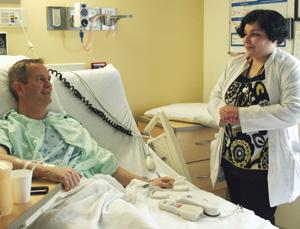
By Jennifer Willems
Between 40 and 50 kidney transplants take place at OSF Saint Francis Medical Center in Peoria, Ill., every year and last week one of them was made possible by Msgr. Eric Powell, pastor of Epiphany Parish in Normal, Ill.
Msgr. Powell, 45, donated one of his kidneys to an Epiphany parishioner during a two-hour surgery on Easter Monday. He was up and walking the same day and was discharged by his surgeon, Dr. Fred Braastad, on Wednesday.
He declined to identify the recipient, other than to say her own family members were not able to make the donation themselves due to their health histories.
“There’s always a chance that it could fail. I was encouraged, however, when the doctor told me I had a very nice looking kidney,” Msgr. Powell told The Catholic Post during an interview in his hospital room on April 14. “He said . . . it’s even now proving to be of benefit to the recipient and I praise God for that.”
Msgr. Powell’s recovery process is expected to take four to six weeks, although he is quick to add that it will take much longer for the person who received the kidney.
“I feel just fine,” he said. “You can tell people really it’s not much of a bother. It feels like you had a terrible ab workout, that’s all.”
The process that took Msgr. Powell into surgery started about five months ago.
“In 19 years of priesthood I was never made aware of any parishioner with a similar need, so I thought it was a rare thing,” he said. “I thought, ‘Well, I know I’m O+ and maybe that gives me a leg up on things.’ So I offered to see if I could be of help.”
Having an O+ blood type means that medically “I play well with everybody,” he explained.
In doing research, Msgr. Powell said he consulted Web sites such as www.giftofhope.org. “There’s a crying need for people who are willing to step up for one another,” he said. “It’s a good thing to think about them and see if perhaps we can help.”
He also consulted church documents like “Evangelium Vitae” (“The Gospel of Life”), Pope John Paul II’s 1995 encyclical, and the Catechism of the Catholic Church.
“You have to take a hard look at someone’s needs and if the repercussions on you aren’t such that you lose while they gain in a fundamental way, then it’s good to think about,” Msgr. Powell said.
“I couldn’t compromise my ministry by helping somebody else, but I have every assurance,” he said. “I’m fine — a little sore — but that really wasn’t an issue.”
His good health and age also made him a viable donor candidate, according to Msgr. Powell.
In addition to his own research, he underwent medical tests and a psychiatric evaluation to make certain he was physically and mentally able to take this step.
“OSF takes pretty good care in ensuring that you’re well informed and well screened,” Msgr. Powell said. “There are all sorts of checks and balances along the way to ensure that if somebody didn’t realize what they were about to do they could easily end the process.”
Before the surgery he said he felt no trepidation and tried to focus only on the benefits to the recipient.
Msgr. Powell had the support of Bishop Daniel Jenky, CSC, who “spoke some gracious words to me and encouraged me. They’re still ringing in my ears.”
He also had the support of Epiphany’s 1,600 families, whom he has served since 2002, although they didn’t know what he was considering until Easter.
Msgr. Powell asked people to ponder how they can help others and suggested they look into organizations like Gift of Hope.
“It’s just amazing what happens when you put a little information in your hands and realize you can make a difference in somebody’s life,” he said.
(Editor’s note: The above story was provided courtesy of The Catholic Post, newspaper of the Peoria, Ill., Diocese.)








